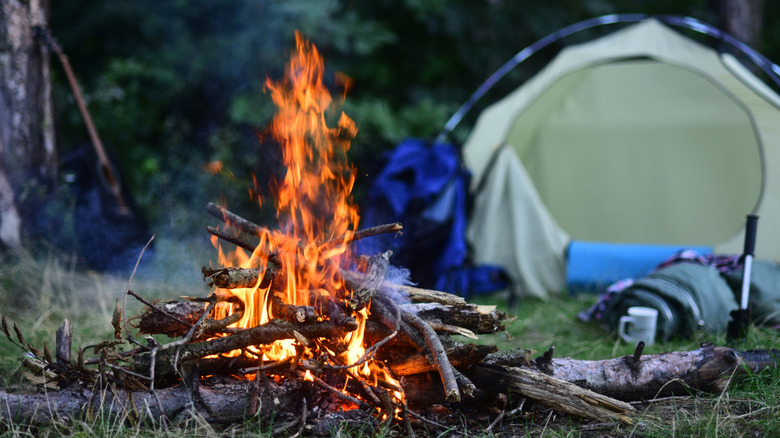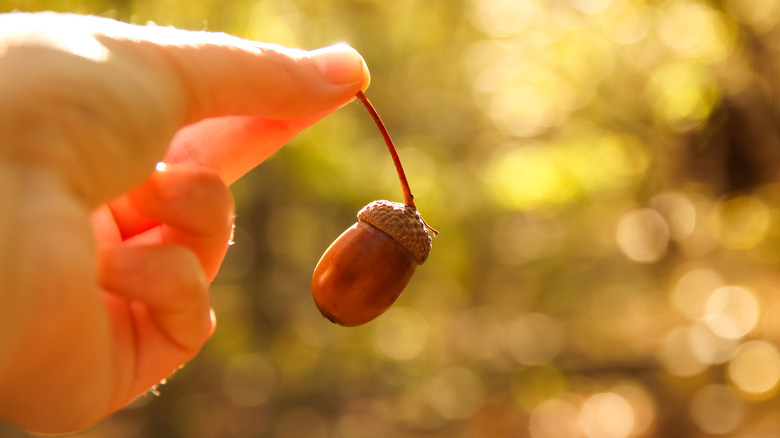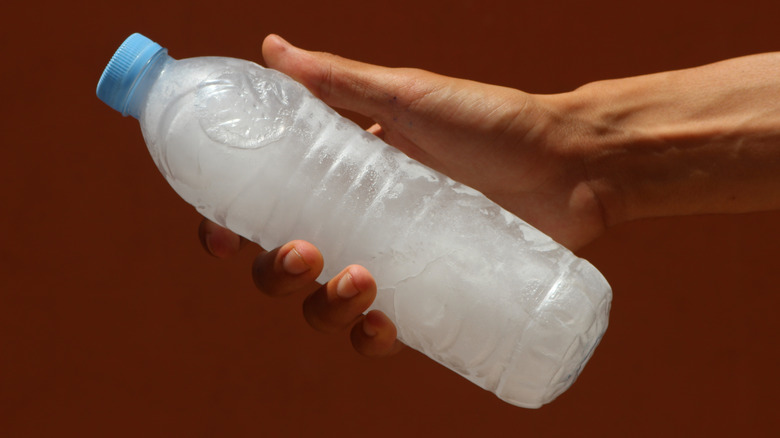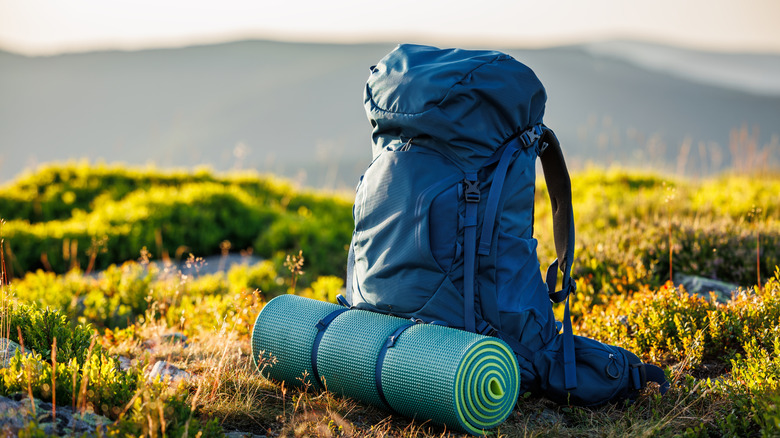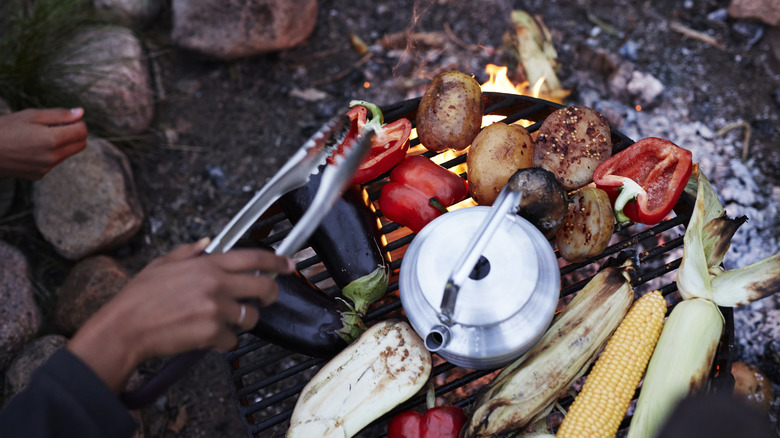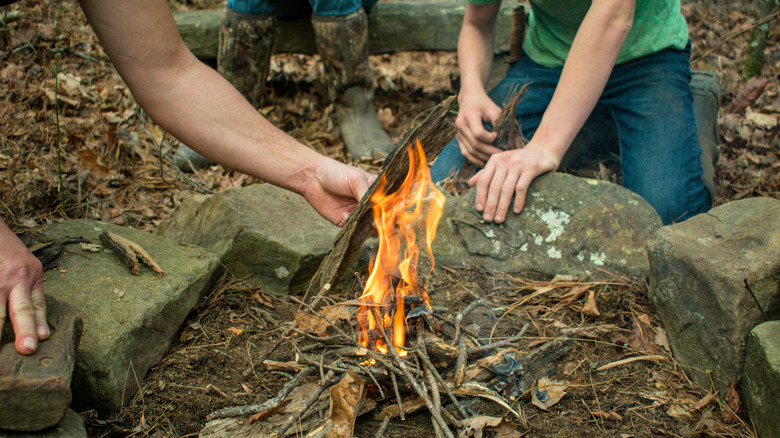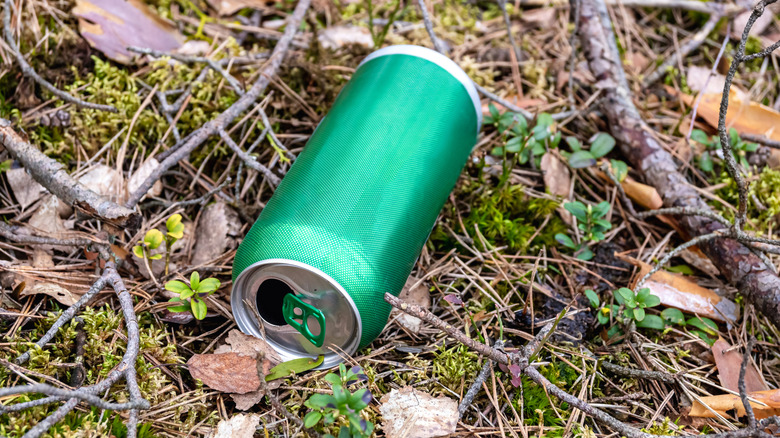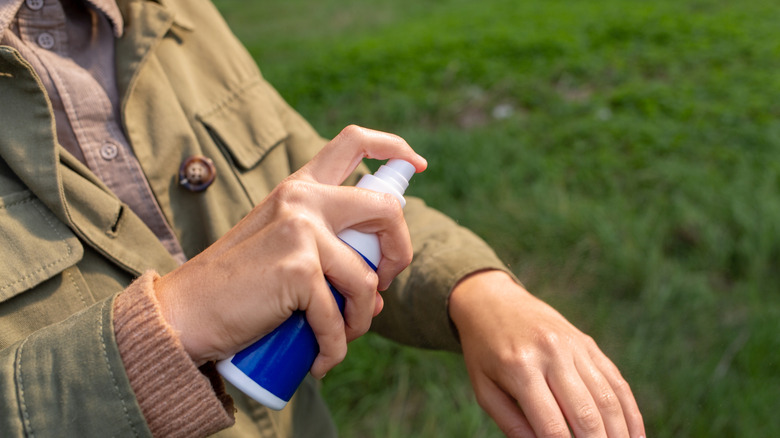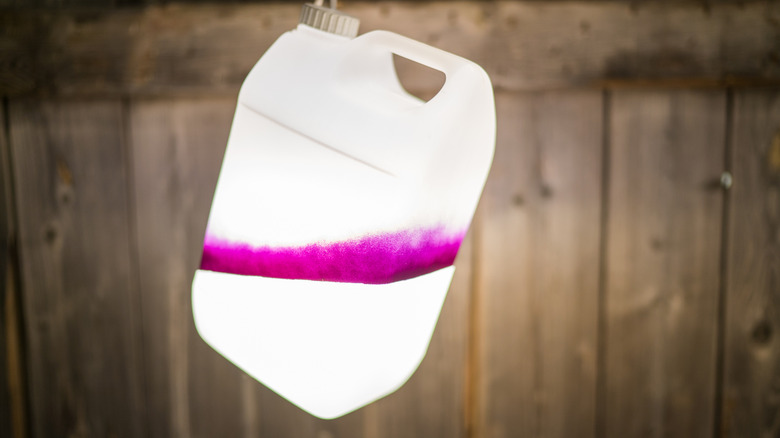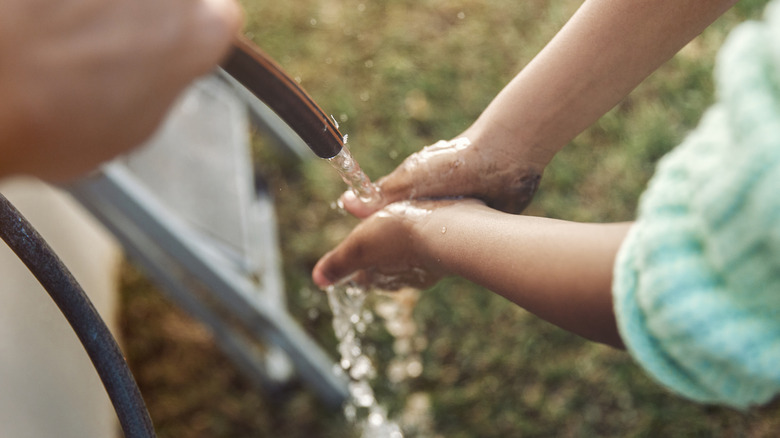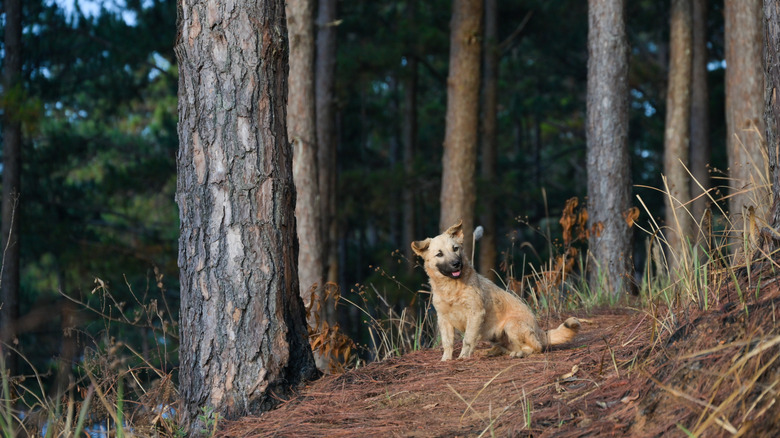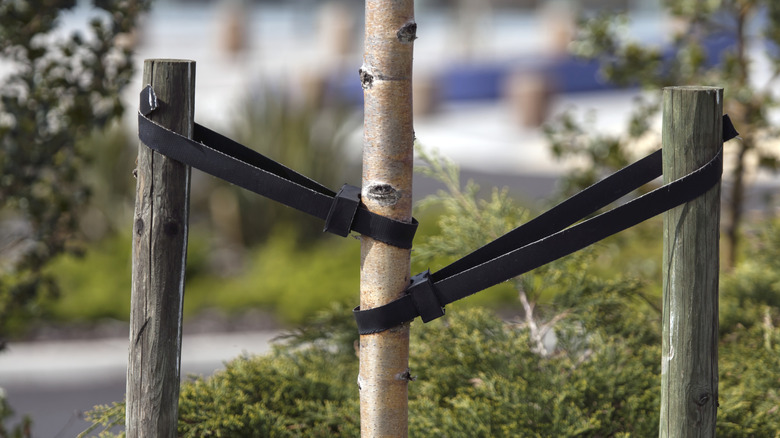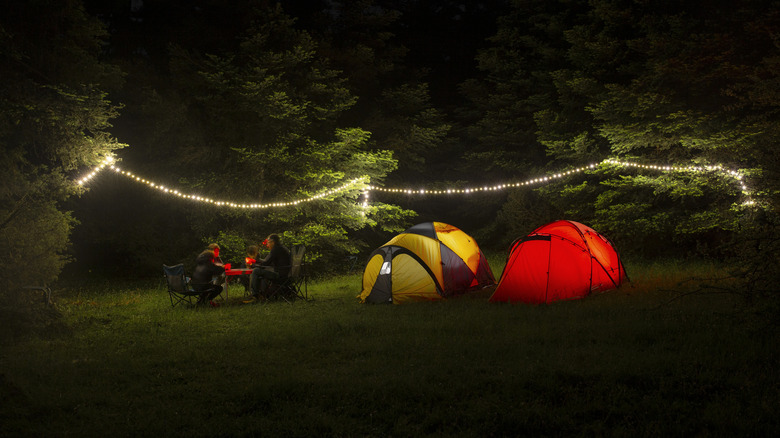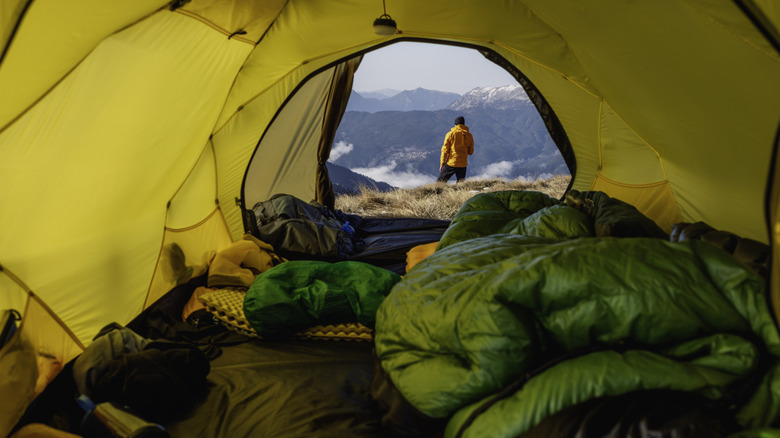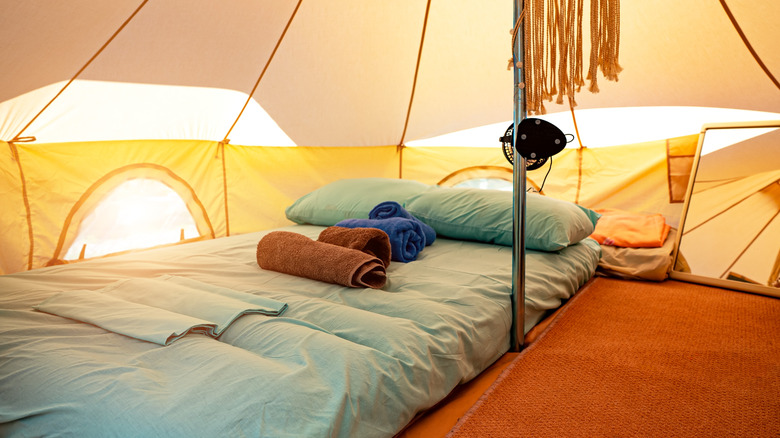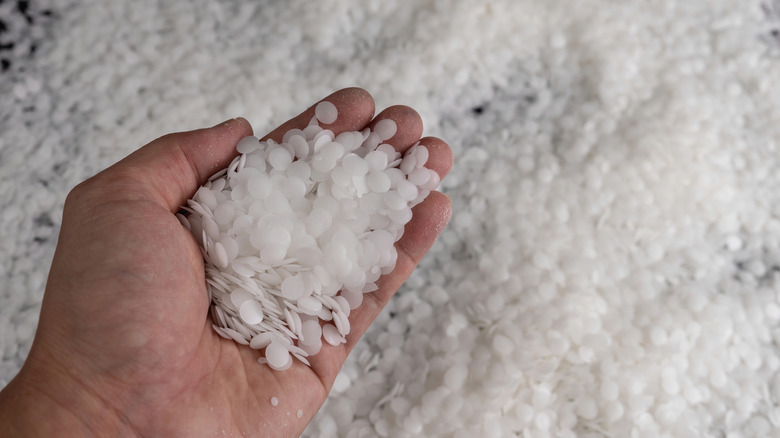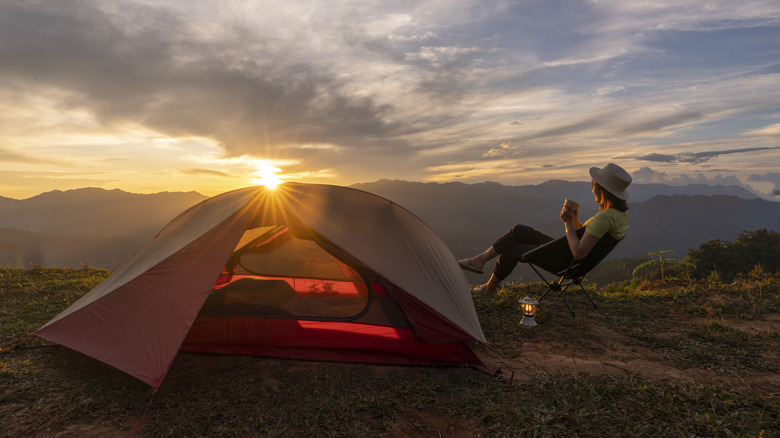DIY Camping Hacks That Will Instantly Improve Your Outdoor Adventure, According To Reddit
In a world hooked to digital screens, simply unplugging and getting lost in nature has become more important than ever. And one of the most old-school ways of going back to reconnect with the earth is to pack up your camping gear and set off into the wild for an epic adventure. Switching off from all the noise in the middle of nowhere sure sounds like a peaceful idea, but it also conveys many inherent challenges related to convenience, comfort, and safety that go beyond wild bear encounters.
This collection of do-it-yourself camping tips gathered from real-world experiences aims to help you tackle common outdoor problems with ease, whether you're on a solo camping trip, heading out with friends and family, or even taking furry companions into the wilderness. From staying warm and dry through chilly nights to keeping bugs at bay and even making your own whistle with natural elements, here's a handy guide to DIY camping hacks that will improve your outdoor adventure.
Make your own emergency whistle
An emergency whistle is a must-have in the outdoors, but if you don't have one on hand, you need only look around on the ground to find an acorn. The cap of an acorn is nature's gift to campers, serving as a readymade (surprisingly loud) whistle that can cut through the sounds of the wild, in case you get lost or want to draw your fellow campers' attention.
One Reddit user — who gave readers a play-by-play of how to make an acorn whistle — pointed out the effectiveness of this tiny instrument on any outdoor expedition, not just when camping. "When fishing at night on rocky piers, I carry a few acorn caps in my pockets and fishing bag just in case I slip, fall, and get hurt." To make an acorn whistle, all you need to do is hold a clean cap between your thumbs so they form a small V-shaped opening. Blow firmly into the gap while adjusting the angle until you can hear a clear, piercing sound ring out.
Frozen bottles instead of ice packs
A foolproof DIY travel hack loved and used widely by the campers of Reddit is to swap out traditional ice packs for frozen bottles of water. Ice packs may keep your food, beverages, and other perishable items cool, but they will eventually melt. And once they do, they'll be nothing more than dead weight taking up precious space in your cooler. Frozen bottles, on the other hand, do double duty. They will keep everything cold while they're still all iced up, and when they thaw, you can just drink straight out of the bottles.
This trick works with almost any beverage you would want to bring along on your camping excursions. One Redditor gave a great suggestion: "Make smoothies at home and freeze them in baggies. Use those as ice packs for your cooler and have them for breakfast." Just don't fill your bottles to the brim, so the liquid has room to expand as it freezes, and there is minimal spillage. Also, be careful when trying this hack with glass bottles, which have a higher chance of breaking when frozen solid.
A simple hack to waterproof your backpack
Keeping your gear dry when out camping is absolutely paramount, as carrying a bagful of wet clothes and equipment can quickly turn a fun adventure into a nightmare. A simple, low-cost hack that has been tried and tested by the campers of Reddit is to line the inside of your backpack with a heavy-duty trash bag before packing for your trip. Of course, a waterproof backpack or dry bag is always recommended, but in the off chance that you don't have one handy, this DIY trick can be your last-minute savior.
Do note that using regular garbage bags may not be as functional at keeping your things dry as trash compactor bags, which are far thicker and durable. "I put everything I don't want to get wet in a garbage bag (trash compactor bag) in my backpack," one Redditor wrote, with an anecdote to reiterate their effectiveness. "Using a garbage bag also kept my dry stuff dry the one time I fell in a creek, something a pack cover won't do."
Prep your food in advance
You may not have access to Michelin Star food in the middle of the wilderness, but there's no reason for your taste buds to suffer on camping trips. A little prep before you leave home can mean the difference between enjoying the comfort of a home-cooked meal by the campfire and a sad can of beans. Marinate proteins, chop veggies, and pre-portion spices, so they're all ready to be tossed onto the pan when you're hungry. And when you're done cooking, just wipe up all the pan grease with a napkin and throw it into the campfire to keep the flames going.
Food prepping also means fewer dishes and, therefore, less cleanup work. Foil pack meals are great for this purpose. You can prep everything from omelette squares to chicken and potatoes in tinfoil, which can be cooked over coals (not direct flames). Ziplock bags are another mess-free storage option, with one Redditor suggesting: "I will cook some things ahead of time, like taco meat, and freeze in a ziplock bag so that the bag is flat."
Make your own fire starters
There are plenty of excellent campfire alternatives on the market today, but (as seasoned campers will agree) nothing comes close to going the primitive route and building your own campfire. All it takes are a few everyday items you probably won't have any use for around the house to use as fire starters. Dryer lint is a Reddit favorite, with campers swearing by its effectiveness to spark up. The next time you clean out your lint trap, don't throw the fluff away. Stash it in a small container and you'll have yourself some lightweight tinder for your camping trip.
Another popular way to use dryer lint as a fire starter (loved by Redditors) is to simply stuff empty egg cartons with it, pour over melted wax to seal each section, let it all dry, and tear off a piece whenever you need it. A thrifty Reddit user suggested melting out leftover wax at the bottom of candle jars to repurpose as a fire starter. Vaseline-dipped cotton balls are also a tried and tested trick to get a solid fire going.
A handy DIY alarm using basic items
Deep in the woods, your thin tent walls won't always give you enough protection against curious, wild visitors that wander in. Having an alarm on the campsite can help alert you to any dangers lurking too close and hopefully scare them away. It's easy to make your own DIY alarm with a few things you might already have handy on a camping trip.
One classic setup involves running a thin line around the perimeter of your campsite, on which you can hang empty cans. Attach this to a handmade trigger using sturdy sticks found in the woods. So, when something tries to walk in, the sticks will hit the cans and clang you awake. Throw some pebbles into the cans for a louder sound. If you're carrying any metal objects, like utensils or carabiners, they can work just as well. As one Reddit user suggested, you can also just string a fishing line around your campsite to create a boundary that will keep bigger animals (like bears) out.
Create your own non-toxic bug spray
Camping without a steady supply of bug spray is practically an invitation for mosquitoes, flies, and gnats to join you by the fire. The good news is that with just a few simple household ingredients, you can make your own non-toxic bug spray that will be gentle on your skin and keep insects far away from your campsite. "Lavender and Eucalyptus oil mixed with rubbing alcohol and distilled water" is an effective natural bug spray recipe, according to one Reddit user.
For something a little more potent, mix equal parts witch hazel (or vodka) and water, and then load it up with a blend of oils like citronella, cedar, geranium, peppermint, and soybean, all low-risk ingredients used in bug repellents, as noted by the Environmental Protection Agency. Sage and rosemary can also act as no-entry signs for mosquitoes, so campers suggest tossing some leaves into the campfire. If leeches are your problem, a Redditor recommends using an easy mix of tea tree oil and water, and spraying it all over your legs and shoes.
Make your own water lantern
If you find yourself at camp without a lantern, don't fret. There's an easy way to make one, using just a bottle of water and a light source (your phone torch, for example). All you have to do is fill a clear or translucent bottle, jug, or canister with water, remove any labels obstructing the outer surface, and place it over your flashlight. It's that simple. The water will diffuse the light, creating a soft glow that can light up your tent or campsite rather well.
The same trick works just as well with a headlamp, if you're carrying one. According to a Redditor who swears by this quick fix — to the point that they don't even start a campfire anymore — you can attach your headlamp straight down the mouth of the container, considering that it is wide enough. The user said that "It works best when hanging from a branch since the light is pointing at the bottom. Even on low there's enough light to walk around the camp once your eyes adjust."
Soap shavings can be a lifesaver
Cleanliness should not feel like a luxury when you're camping. The last thing you want when you're out in the remote wild and far away from hospitals is ending up with a stomach or throat infection thanks to dirty hands. A smart way to stay hygienic without lugging around bulky soap bars is to make single-use soap shavings before you leave home. All you have to do is run a vegetable peeler along a hard bar of soap to create thin flakes or curls. Transfer these shavings into a small waterproof baggie that you can draw from.
It's best if your hands are completely dry when dealing with these delicate slivers to avoid a soapy mess. Many campers also flag the issue of soaps (even the biodegradable kinds) being detrimental to natural water systems. So, as a seasoned camper on Reddit suggested, "Soaps should always be used at least 200 ft from water and discarded by either being cast over soil at least that far away or poured into a small cathole."
A simple tether to keep your furry companion safe
Solo camping can be an antidote to loneliness, but for those who don't want to venture out completely alone, bringing along a furry companion can make a world of difference and make your great big outdoor adventure all the more special. Of course, keeping your pet safe is key to making sure the fun never stops. One way to do that is by making a fuss-free DIY tether that your pet won't mind.
To make this contraption, string a sturdy rope or cable between two trees that aren't standing too far from each other. To this doggy zip line, secure your pet's leash or harness with a carabiner, so they remain close to you on the campsite. At the same time, it still gives them some room to explore independently. Keep the leash short, if you don't want to end up like this Redditor whose pet "tangled its long leash around guy ropes, trees, picnic table legs, chairs and rocks."
Use your belt to create a hanger
Experienced campers know that belts don't just hold your pants up; they can also be used to hang your camping gear. This humble wardrobe item can conveniently double as a makeshift hanger in the great outdoors. If you want to keep your stuff off the ground, simply tie your belt around a tree branch or tent pole. Then, attach some carabiners, zip ties, or S-hooks — anything that can pierce through the belt's holes — to hang all you want, from gloves, to lanterns and water bottles, or even wet socks left out to dry.
A belt hanger can keep your essentials clean and dry, especially when space is limited and you don't want to clutter your tent. Many on Reddit also swear by multi-pocket shoe organizers that can either be hung inside the tent or outside, allowing ample safe space to store utensils or toiletries that you can easily reach for.
Turn some things fluorescent
When night falls at a campsite, there's stuff even more dangerous than potential bear encounters out there. We're talking about tent ropes. It's easy to stumble over these tethers when you're scrambling your way back to your tent in the dark. To avoid this all too common hazard, make your guy lines glow. You can either clip on a few cheap glow sticks onto them, wrap them in neon tape, or dab them with some fluorescent paint so they pop under the lights, and you can see where you're going.
You can use the same trick on other essential camping gear like tent stakes, zippers, knives, or water bottles that you may have to reach for in the dark. Another idea to hazard-proof your campsite is to cover sticks or small stones with non-toxic, glow-in-the-dark paint during the day and create a trail that can light the way back to your tent at night. And if you're traveling with a pet, it's not a bad idea to add a few brushstrokes (or a glow stick) to their collar.
A quick DIY heater to keep you warm all night
Sometimes a sleeping bag just isn't enough to stay cozy through chilly camp nights. And in the absence of electric heaters or other paraphernalia that typically keep you warm at home, a good ol' hot water bottle can be just the thing you need. If you're carrying the real deal, you can simply boil some water, fill it up, and keep it close to you while sleeping. A simple DIY alternative is to fill your regular bottle (preferably non-plastic) with hot water, wrap a towel around it, and tuck it inside your sleeping bag.
Layering is another technique to add warmth. You can line your sleeping bag with some dry clothes and even stow them away near the feet a couple of hours before bed. This setup works wonders at both keeping you cozy and ensuring that your clothes for the next day are nice and warm. And considering that sometimes the humblest solutions can go overlooked, this one from a Reddit user is a pertinent reminder: "Make sure you are putting on fresh clean socks before bed, not the ones you wore all day."
Make your own camp floor
Sleeping in the wild should not have to mean compromising on homely comforts. With a simple floor upgrade, you can take your tent from basic to cozy, all with the help of interlocking foam mats. These colorful tiles can be just as foolproof at a campsite as they are in a playroom, turning the cold, hard ground into a padded bottom that will keep your tent clean and warm. Cushioned flooring will also be kinder to your back after a long day of outdoor adventuring.
Yoga mats, moving blankets, or even thick rugs can work just as well. Tarp is another lifesaver when it comes to keeping the insides of your tent clean, dry, and free of damage. As one Redditor wrote: "It protects the bottom of your tent from wear and tear and adds another level of waterproofness." Lay a sheet before setting up camp, and then add another for extra insulation on the tent floor, but make sure the tarp doesn't extend past the perimeter of the tent to avoid leak-ins when it rains.
Carry some all-purpose wax
A block of all-purpose wax will hardly take up any space in your camping gear, but in times of need, this tiny essential can end up being a true lifesaver. If you're stranded in the middle of nowhere with a rusty zipper on your backpack or tent, a little wax can work wonders. You can also prep for such an event in advance, as one Redditor suggested: "rub along the unzipped zipper. rub well, the wax will seal the zipper and make it work better as well." This tactic will also work to prevent water leaks from outside the tent.
This wax can also be used to waterproof any leather items you're carrying, by simply rubbing it all over the surface of your shoes, jackets, or gloves and gently melting it in with heat. Another good idea is to pre-dip some matches in wax and seal them to protect them from moisture, so they strike up easily even in damp weather.
Methodology
For this guide on DIY camping hacks, we aimed to combine fresh ideas with time-tested tricks that campers around the world swear by. First and foremost, we tapped into first-hand experiences shared by the Reddit community. Subs for camping, hiking, or outdoor adventuring in general are treasure troves of practical tips, personal anecdotes, and hacks from seasoned thrill-seekers. These user-generated insights helped us highlight clever budget-friendly solutions that work in real-world camping scenarios.
Beyond Reddit, we were also inspired by voices on various other social media forums and popular camping advice platforms to ensure a well-rounded perspective. Some hacks — like the acorn cap whistle or using frozen water bottles as ice packs — did not require such deep examination, considering that they are traditional camping wisdom passed around in the circuit for years. This collective knowledge helped shape this list of creative, accessible, and safe tips that campers of all levels can try on their next outdoor adventure.
